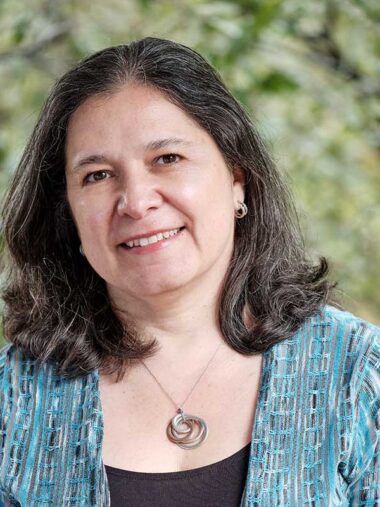
Natasha Noy
- Khoury Alumni
- BS Applied Mathematics ’91, Lomonosov Moscow State University; MSCS ’92, Boston University; PhD in Computer Science ’97
Research has been a driving force of Natasha Noy’s career. After completing her bachelor’s degree at Moscow State University, Noy began applying for United States-based PhD programs in computer science while still living in Moscow in the 1990s. Boston was one of the cities she had heard of, and she says, “It was mostly Boston where I wanted to go, and to the program that gave me full assistance – which was Northeastern.”
Noy first experienced “how to do real research” at Northeastern. Her research assistance came out of a grant with several professors collaborating on it. “I was immediately exposed to multiple points of view. There were a lot of firsts for me as part of that research. It grew into my dissertation.” The grant was focused on using knowledge representation methods to find information in medical and biology text. Noy’s dissertation was ultimately titled “Knowledge representation for intelligent information retrieval in experimental sciences.”
After completing the program, Noy taught for a year at Northeastern. She fondly recalls teaching an introductory computer science class where students wrote game programs. “The last day of the semester, they spent the whole night in the lab playing each other’s games.”
Her research led to a move to Stanford for a post-doctoral position working on knowledge representation and systems, “AI as it was perceived back then.” She worked as part of a group of computer scientists in the medical school. Their work became the Protégé ontology editor, which helped scientists build ontologies describing their domains.
Northeastern set me on the path of being a researcher, asking interesting questions, finding something new. In some sense, my research at Google goes back to what I was doing when I was at NU: helping users find information
After fifteen years as a research scientist at Stanford, she was looking for a change. She was enjoying the applied research, so she joined a research team at Google, one of the “bigger and more exciting labs for me.” Having joined a company built around searching the web, she eventually started Dataset Search – a search engine for datasets, akin to what Google Scholar is for papers.
Noy says, “Northeastern set me on the path of being a researcher, asking interesting questions, finding something new. In some sense, my research at Google goes back to what I was doing when I was at NU: helping users find information.” Noy was elected as an AAAI Fellow in 2020.
Assessing Northeastern today, Noy is impressed by its growth in stature. “I’ve moved across the country, and seeing NU from afar with its new professors, programs, and alumni, I’ve seen the PhD become even more valuable over time. Being selected as part of 40 for 40 is really special. It’s humbling to receive this award.”